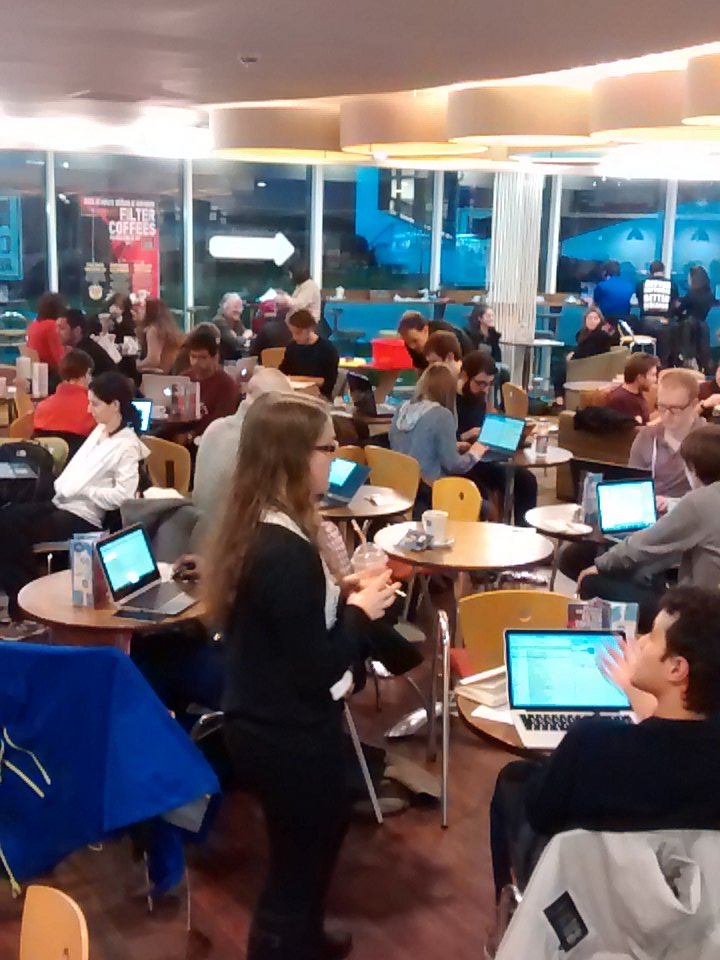Our first Code Cafe: First steps with R
A couple of weeks ago, a small group of us hit on the idea of running research programming tutorials in a cafe. The ‘plan’ was that we’d develop some self-paced programming tutorial material, take over a section of the main campus Cafe (Coffee Revolution) for a couple of hours in the evening and invite some researchers to come and learn something new for free.
For our first session, we chose to do a very gentle introduction to R. The students worked through the material, which started right at the beginning with installing R and RStudio, while a group of volunteer facilitators walked the room answering questions, solving problems and forming collaborations.
I can’t stress the importance of the facilitators enough! There is no chance that this format would have worked well without a group of skilled facilitators. On the day, I was joined by
- Research Software Engineer, David Jones
- PhD Student, Claire Green
- Post Doc, Will Furnass
I also had support of a few other people in the development stages. Thanks so much to all!
It was a lot of fun to do and student feedback has been fantastic! My favourite comment came from a medical doctor who said ‘I had no idea about computer programming and I don’t think I would be brave enough to try it on my own. Yesterday, I realised that R can be something useful and not really hard to learn.’
I find interactions like this to be hugely motivational!
There was a real buzz in the room, everyone seemed to learn something useful and I walked away from the evening with a couple of interesting follow-up collaborations in the bag. There were lots of calls for future sessions on topics ranging from more advanced R through to Python, MATLAB, Mathematica and High Performance Computing. The self-paced, flipped-classroom style of teaching was also a great hit!
So, that’s what went right. What about what went wrong?
Installation Problems
We deliberately allowed time for the installation of R in the session. Ensuring that the attendees had a working install of R and RStudio on their own kit was part of the point. Before the session, I did trial installs on Windows and Mac and everything went without a hitch. Other members of the team tried fresh installs on Linux.
“Installation’s going to be a doddle…no worries” I thought.
The very first attendee who called me over for help couldn’t get RStudio started on her Mac. It crapped out with an error message I’d never seen before. A bit of googling determined that it was because she had several old versions of R already installed and RStudio took exception to this.
We also had Linux users of various flavours and most of them had problems. A user of Arch Linux gave up on trying to install RStudio and used the command line instead. One linux user called me over after he started installing the ggplot2 package asking ‘This has been compiling for ages, is that normal?’ Fortunately, we were in a cafe so he could go get himself a brew while waiting.
Some people already had versions of R and RStudio installed from waaaaay back and so didn’t feel it necessary to upgrade to the latest versions. These people discovered that they couldn’t install packages because ‘foo isn’t available for R version whatever’.
It was all rather painful to be honest! We were in full technical-support mode…but at least people left the session with working, up to date versions R and R Studio….mostly!
Power!
There wen’t many power sockets. We didn’t think much about this in advance. Ball dropped!
For a feeble attempt at a defence I’ll mention that the battery on my laptop is superb and I spend hours working in the host cafe without worrying about power. Since I’ve been so spoiled, I’ve forgotten how important a mains socket is when your battery sucks.
Next Steps
This session was an experiment — something quickly spun up to see if it might work. I’m happy to report that it did!
Our main problem is that we’ve now created demand. Demand for repeats of this session for new audiences, demand for new material and demand for further consultancy. How fortunate for us at Sheffield that we have a newly created Research Software Engineering group to help meet this demand.

